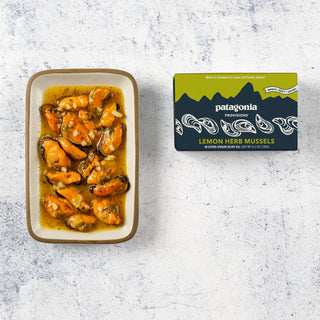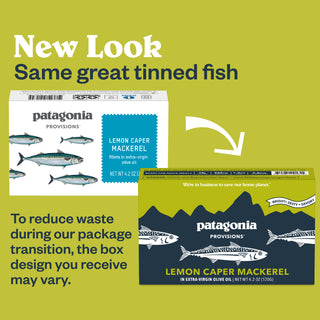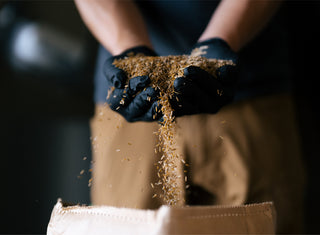Craft beer has transitioned from niche hobby to mainstream mainstay over the last decade and a half, and now accounts for nearly 25% of the $117 billion US beer market. This growth has brought changes to the industry including diversity, accessibility, and regional specialization, but one mainstay among craft beer lovers, old and new, is an emphasis on quality. While craft beer now has a much wider drinkership, its fans remain no less savvy as to what they consider a good beer, a well-made beer, and take a significant interest in their beer’s ingredients and flavor profile, choosing craft over macro because they believe it is a better quality product.
However, when it comes to organic craft beer, brewers and customers have yet to be persuaded that they will experience a product that will meet their qualitative expectations. Placing an emphasis on quality will be a key element in bringing more drinkers into the organic craft beer market. Patagonia Provisions’ beer program has a strong focus on showcasing the quality potential of organic brewing ingredients – offering customers an accessible taste of high quality beer brewed with organic ingredients.
“We need to meet the Patagonia customer where they are – that’s why we’re bringing organic beer nationwide – with Deschutes, Topa Topa, and our taproom partners around the country.”
– Paul Lightfoot, General Manager, Patagonia Provisions
But in order to understand how organic beer can be as high quality as conventional beer, let’s first consider what organic beer actually is.

What is organic beer?
Like organic food, organic beer must be certified by the US Department of Agriculture (USDA) to legally sell and market itself as organic. Beer is an agricultural product whose key components aside from water are yeast, grain and hops. In order to achieve organic certification, each element must be individually certified organic from a traceable source. Ingredients must be grown without the use of chemical pesticides or fertilizers on certified organic farms whose soil preparation, planting and harvesting processes are monitored. The brewery must also receive organic certification for its production methods. If this sounds complicated, it is. The process is rigorous and can be expensive–however, the finished product is better for the planet than beer brewed with conventional ingredients.
Based on these stringent production criteria, a synthetic pesticide-free beer should be as good if not better quality and have an equal or better flavor profile than a non-organic one. However, outdated industry preconceptions of organic beer production have throttled organic beer’s growth…until now.

Courtesy of Hopsteiner
The challenges of brewing organic beer: Real and perceived
While the quality of organic beer has not necessarily been lower than it is today, and this certainly has not been the case across the board, there are several reasons why this perception exists. Brewing high quality craft beer requires both exemplary brewing skills and high-quality ingredients. As craft beer has grown and diversified, brewers have become accustomed to accessing a wide range of different ingredients to use in their beers, such as specialty grains like rye and spelt, different types of malt like crystal and chocolate, and a growing stable of new hop varieties such as Eclipse, Nectaron and Solero. But these options have not been available organically because there hasn't been sufficient demand for maltsters or hop farmers to produce them. This has meant that brewers making organic beer have not had the same array of choice that those making non-organic beer have had, which has created a perception that organic beer is lower quality.
“We have always seen the quality of our organic ingredients as better than conventional—though more limited in variety. We’ve long said that in committing to brewing with all organic and regeneratively farmed ingredients our crayon box is smaller. It’s a constraint we’ve welcomed as we’ve worked to increase awareness.”
– Sandy Boss Febbo, Co-founder, Bang Brewing.
Another component to this issue is that hops, which provide crucial flavor elements to most beer styles, are very delicate plants, and can struggle to survive without the chemicals and pesticides used in non-organic hop farming. This has also led to reduced supply and choice, limiting organic brewers and raising questions about quality. However, new hop breeding programs like those implemented by industry leaders including Yakima Chief, Roy Farms and Hopsteiner have resulted in new, more resilient organic hop varieties being bred which have huge potential to open up organic brewing to a wider range of flavor profiles. Hop farms like Hopsteiner put their organic hops through the same thorough testing as their non-organic ones to ensure that they are of the highest quality.
“Our breeding program is very focused on the agronomics of hops – building resilience to diseases, superior yields and nutrient use sufficiency, so our hops are ready-made for organic farming. Our rigorous quality expectations mean we put all our hops through the same high-grade testing, including lab analysis, yield comparison and grading for aromatic quality.”
– Doug Wilson, Director of Sales and Marketing, Hopsteiner.
Similarly at Admiral Maltings, Ron Silberstein has seen both quality and choice of organic grains increase significantly, creating greater opportunities for organic brewing. Admiral, which provides Patagonia Provisions with their Regenerative Organic Certified® (ROC) rye, malts locally sourced organic grains, including organic Copeland barley from Cascade Farms, and organic Patwin wheat and Red Floriani corn from Fritz Durst. They also source ROC Pilot barley from Hedlin Farms, from whom Patagonia Provisions source their ROC wheat for their organic crackers. Most of Admiral’s organic ingredients which are sold to nearby craft breweries in California and Washington, such as Aslan and Pure Project.
“When I first started in 1996, there was virtually no organic malt available. Since then it has exploded in choice and variety. The quality, through time and experience has only improved and now there is an added layer of quality both in the grain and its impact on soil and climate through Regenerative Organic Certified®.”
– Ron Silberstein, Co-founder, Admiral Maltings.
The successful cultivation of organic Kernza by The Land Institute with the support of Patagonia Provisions also offers a new opportunity to raise the quality bar for organic beer. In addition to its positive environmental benefits, Kernza offers a unique and exciting flavor profile for brewers to play with. Participants in Patagonia’s beer program are leaning into Kernza’s rich, nutty umami notes to brew beers with organic ingredients, which showcase these characteristics so the quality of the grain shines.
The nationwide retail rollout of Patagonia Provisions’ partnership with Deschutes will enable drinkers in all fifty states to taste for themselves that organic beer – be it alcoholic or non-alcoholic – can be as high quality and flavor-forward as non-organic beer. As a wider range of quality organic ingredients become available to brewers, there is no longer any reason for organic beer to be considered lower quality. The task now is for advocates of organic and regenerative organic agriculture to share this message.

Photo by Whitney Whitehouse, courtesy of Deschutes Brewery
Positive opportunities: How high-quality organic beer can open doors for farmers, brewers and drinkers
Perceptions can be challenging to shift and stigmas difficult to overturn, but as customers and producers become increasingly environmentally conscientious about their consumption choices, the time is ripe to place organic beer into drinkers’ hands and present them with proof that it’s of a standard that matches their favorite brand. Direct outreach will be key to the success of upending drinkers’ expectations, and Patagonia, Deschutes, and Topa Topa plan to engage customers with targeted sampling opportunities.
“In our industry it truly is about getting the liquid to the lips of the consumer. If we execute making a truly quality certified organic beer, then we know the consumer will come along for the ride with us and assist us in altering the perception of what organic beer can be.”
– Jack Dyer, Founder and CEO, Topa Topa Brewing Co.
Education, of both drinkers and producers, is also a key element in effecting change. Craft beer culture is conversational, with hype and excitement around new breweries, beer styles and beer releases mostly fueled by word of mouth and social media. Building a buzz means getting customers excited, both through tasting and storytelling. In an industry that thrives on mythmaking, Kernza’s developmental history and positive environmental trajectory make for great customer access points, particularly as increasingly conscientious drinkers seek out products that are responsibly sourced.
“Beyond the traditional reasons to consume organic ingredients, Kernza has an amazing story of soil regeneration. We've found our guests are even more interested in the ingredients and sourcing when we explain the use of Kernza in this collaborative beer.”
– Tara Hankinson, Co-founder, TALEA Beer Co.
For brewers and growers, education pairs with innovation. The improving quality and increasing quantity of organic brewing ingredients and farming practices also enable and encourage innovation that has benefits across the board – with techniques and practices pioneered in organic production leading to industry-wide improvements. Improving ethics in organic production demonstrates how it can be effective in the wider industry space.
“The more we tell the story of why organic matters and share the hard work of the people growing these ingredients, the more everyone will understand the importance of organic beer.”
- Winslow Sawyer, Co-founder and Head Brewer, Pure Project
This is equally important with non-alcoholic organic beer, which has a qualitative double challenge to overcome, as non-alcoholic beer also has a reputation for being of lower quality than its alcoholic counterparts. To ensure that their non-alcoholic organic Kernza beer is of the highest quality, Deschutes have employed cutting-edge BrewVo technology in its production. BrewVo’s Sustainable Beverage Technologies (SBT) works by allowing brewers to gently remove the alcohol from beer while retaining the sensory elements of the beer that are wanted, like flavor, aroma, body and mouthfeel, color and head retention. Through a combination of reverse osmosis and nested fermentation BrewVo’s SBT brings a new standard of quality to non-alcoholic beer, which will ensure Deschutes’ organic Kernza non-alcoholic beer is of equal standard to its alcoholic counterpart.
“SBT’s BrewVo system is the best way to produce non-alc beer. It allows us, in combination with proprietary brewing knowledge, to produce non-alcoholic beer that is full-fidelity and does not sacrifice any of the sensory elements that make beer exceptional.”
– Peter Skrbek, CEO, Deschutes Brewery.

Photo by Andrew M. Snyder, courtesy of Deschutes Brewery
Raising the bar for organic beer
The advantages and opportunities that investing in organic beer and organic brewing ingredients offer to the beer industry as a whole are huge. Drinkers are able to enjoy high quality, organic beer that is more responsible for the planet versus its conventional counterparts, while producers are able to expand their range, offering brewers greater opportunities to work with organic ingredients to make more great beer. By brewing high quality, accessible beer with organic ingredients, Patagonia Provisions and its beer program partners are proactively working towards a goal where overall organic beer production increases due to greater demand and wider availability of high quality ingredients.
“The industry has likely perceived organic ingredients as lower quality simply because they haven’t had a lot of options to choose from. As we scale these organic and regenerative ingredient options for brewers, we expect more will step into the organic beer space – a win for the environment and our customers alike.”
– Paul Lightfoot, General Manager, Patagonia Provisions.
Ruvani de Silva is a travel-loving British Sri Lankan beverage and food writer based in Austin, Texas, with bylines including the Washington Post, Good Beer Hunting, VinePair and Modern Farmer. Her work focuses on sustainability, DEI, travel and culture. When she's not writing, you can find her trying to recreate her favorite dishes, cocktails and beers in her kitchen or curled up with a good book. Find her @amethyst_heels and ruvanidesilva.com.








